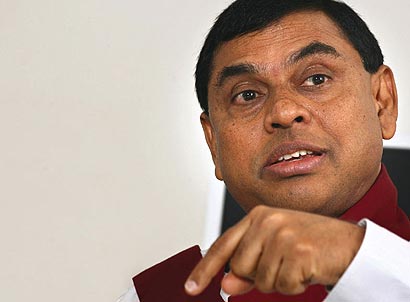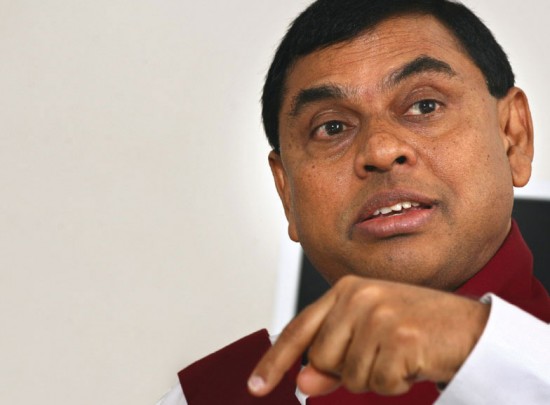Basil’s fear about a parallel Tamil army is baseless
“Some things you must always be unable to bear. Some things you must never stop refusing to bear: Injustice and outrage and dishonor and shame. No matter how young you are or how old you have got. Not for kudos and not for cash. Your picture in the paper nor money in the bank, neither. Just refuse to bear them.”
~ William Faulkner quotes
When paranoia, takes hold of a mindset of a majority which is already in the grips of a ‘minority complex’, the consequential stream of

President’s brother Basil Rajapaksa who is also the Minister of Economic Development and the man who will most benefit from the Divineguma Bill which was shot down as unconstitutional by the Supreme Court
thinking in that mindset tends to produce and manufacture deceptive and illusory nightmares that continue to haunt the entity, whether it’s a person or a society, to such a frightening degree that the dividing line between illusion and reality becomes blurry and invisible. In such a situation, dreams become nightmares; hunter becomes the hunted, perpetrator becomes the victim and an illusion becomes reality. Police powers granted to the Northern Provincial Council under the auspices of the Thirteenth Amendment of our Constitution would eventually lead to the establishment of a parallel army within Sri Lanka is such a frightening nightmare born out of that warped mindset trapped in its own creation of suspicion, fear and incompetence. Yet it serves the purpose of local politics and plays right into the psyche of the majority that is increasingly becoming intolerant, irrational and unaccommodating.
Minister Basil Rajapaksa has opened his mouth- though very rarely does he express his views on the ethnic issue- of all places to the Hindu newspaper in an exclusive interview. He is reported to have said that Sri Lanka would never risk a provincial government forming its own “army” through devolved police powers. The fear factor is distinct and as clear as crystal. Maybe, once bitten, twice shy.
To quote the Hindu: “Ascribing his main fear to the Tamil National Army — a militant outfit elevated by the besieged 1988-government of the Ealam People’s Revolutionary Liberation Front (EPRLF) in the joint North-Eastern Province in their childish attempt to fight against the Liberation Tigers of Tamil Ealam (LTTE) that had rejected the Amendment and boycotted the election — Basil Rajapaksa asserted that there was no ruling out that a future Northern provincial government would not do the same: ‘If [the NPC] form another army, can we afford another war now?’
Basil’s fear is complete and all-consuming. But it is baseless and the rationale is crazy and unwise. Basil is no junior Minister of this Government nor is he the Minister of External Affairs usually on whose shoulders rest the explaining of our position to foreign leaders and governments. Basil was sent to India because he is the President’s closest political ally in the Cabinet, the virtual “Deputy President” of this country. India too would understand the dynamic of this move. And Basil is no fool. When making himself available to one of the foremost newspapers in the region such as the Hindu, he would realize that each and every word he utters would be closely analyzed and dissected not only by the Indian media but also the reading public of India as well.
But apparently by stating that Sri Lanka could not afford to have another ‘army’ of sorts run by the Northern Provincial Council he concedes more than he realizes. Firstly, he concedes the upcoming Northern Provincial Council election to the Tamil National Alliance. If not, why should he be afraid of a ‘Tamil Army’? He very conveniently forgets that Presidential powers exercised at the center could always override any decision taken at the provincial council level, even to the degree of dissolving the entire Council and handing the governance of the Province to the Governor as in terms of the current arrangement. Secondly, Basil Rajapaksa recreates the fear psychosis among the Southern Sinhalese majority that the possibility of an emergence of a Tamil army is very real and imminent with the full powers delegated and devolved to the Provincial government. This second reason is the real motive behind the usage of the language and diction- to plant the seeds of suspicion and fear- mongering about an invisible enemy within our shores.
Obviously Basil simply cannot label the TNA Chief Ministerial Candidate as a ‘Tiger’, nor can he be castigated as a ‘terrorist’. He is a retired Justice of the Supreme Court, fit and qualified enough to be the Chief Minister of any Province in Sri Lanka, in fact more qualified than most of our Chief Ministers today. When vituperative and malicious labels such as ‘Tiger’ and ‘Terrorist’ are not applicable, the only weapon the Government has is its usual defense-mechanism- oft-used fear psychosis. When one could recall how virtually the entirety of Colombo started running away on ‘Tiger Friday’ on July 25, 1983, reminiscent of the mass exodus that took place in the aftermath of the ‘Japanese Bombing’ during the Second World War, one could well understand the pseudo-bravery the Sinhalese are used to displaying in the absence of real power and strength. It’s no laughable matter, but true. And as always, the truth is unpalatable.
Fear psychosis works. Our own history has ample illustrations to prove that.
Basil Rajapaksa has stated that Mr.Wigneswaran is a candidate of “external forces” who did not represent the people of the North. Basil seems to have forgotten that he himself was elected from the Gampaha district though neither a resident nor a native of that district. Basil hails from the Deep South and he represents the Western Province in Parliament in general and the Gampaha district in particular. Basil must realize that what’s sauce for the goose is sauce for the gander too. His assumption that the Rajapaksa government had given the Tamil people “everything” — roads, railways, water, electricity, schools and hospitals, with nothing left to promise and that a future TNA provincial government would whip up other “emotional issues” that neither it nor the government would be able to deliver is puerile. Such easy ‘excuses’ would hold no water in modern times. The Tamils’ agitational politics that began with the arrival of the Donoughmore Commission and the granting of Universal Franchise has always been a political one and not an economical issue. If Basil could not understand that basic premise of the Tamils’ demand, then he must go to political school again to learn civics and the evolution of the Tamil agitations that erupted almost every five to ten years since we got Independence. Provision of roads and other physical infrastructure would not feed the socially and politically–starved Tamils whose main bones of contention are the language issue and the issue of ownership of a traditional homeland for the Tamils. To say that devolving police powers in terms of the Indo-Lanka Accord of 1987, which gave birth to the 13th Amendment to Sri Lanka’s Constitution, would actually amount to going against Accord is a total fallacy.
Belittling the significance of various chapters and verses of the Thirteenth Amendment might be suitable to the local media and the ultra-nationalist Sinhalese Buddhists, but to express such absurd and illogical arguments in the international arena is self-defeating and counter-productive.
Basil Rajapaksa’s trip to New Delhi was reciprocated by the visit of India’s National Security Adviser (NSA) Shiv Shankar Menon to Colombo, which obviously focused on the same issue- the fate of the 13 A. As was reported, Menon’s visit to Sri Lanka had not gone well for the Sri Lankan official standing. The double-standard and duplicity so adopted by the rulers would one day come to the open forum. As in all other matters, tact and diplomacy are essential ingredients in good governance, but that duo-tact and diplomacy-must be at all times be solidly founded on truth and honesty. When one sheds the garb of truth and honesty, one is invariably left with the nudity of falsehood and dishonesty. Individuals such as political leaders might be able to afford such insults and abuses every now and then but a country and/or a nation simply cannot live with that dishonor and disgrace.

